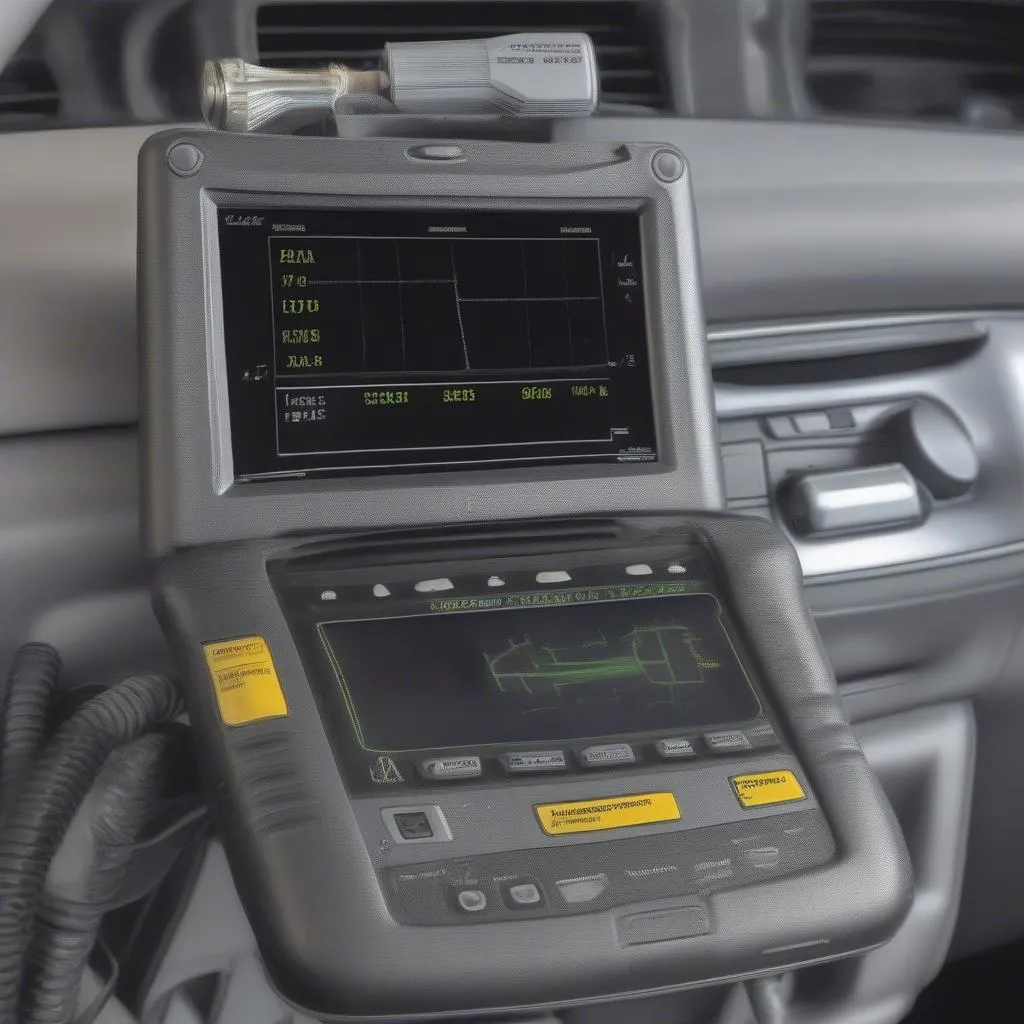Have you ever experienced the frustration of a check engine light flashing on your dashboard, leaving you wondering what’s wrong with your car? Or perhaps you’re trying to troubleshoot a complex electrical issue, but you’re unsure where to start. You’re not alone. Many car owners face similar challenges when it comes to diagnosing and repairing their vehicles. This is where a fixed car scanner comes in handy.
What is a Fixed Car Scanner and Why is it Important?
A fixed car scanner, also known as a diagnostic scan tool, is a specialized device that connects to your car’s onboard diagnostics (OBD) system. This system stores information about your car’s various components and performance, allowing you to identify and diagnose problems.
From a Mechanic’s Perspective: A fixed car scanner is an indispensable tool for any professional mechanic. It enables them to quickly and accurately diagnose issues, saving time and money.
From a Technical Perspective: The OBD system utilizes standardized protocols, such as the OBD-II standard adopted in the United States, to communicate with the scanner. This standard allows for universal compatibility, meaning that a fixed car scanner can be used to diagnose a wide range of vehicles.
From an Economic Perspective: Using a fixed car scanner can be a cost-effective solution, especially when compared to taking your car to a mechanic for every minor issue.
How Does a Fixed Car Scanner Work?
A fixed car scanner works by communicating with your car’s ECU (Engine Control Unit). The ECU is the “brain” of your car, responsible for controlling various functions like engine performance, fuel consumption, and emissions.
Here’s a simplified explanation:
- You connect the scanner to your car’s OBD-II port, typically found under the dashboard or near the steering wheel.
- The scanner sends a request to the ECU for information.
- The ECU responds with data regarding engine codes, sensor readings, and other relevant parameters.
- The scanner displays this data in a user-friendly format, helping you to understand what’s wrong with your car.
Common Uses of a Fixed Car Scanner:
- Read and Clear Diagnostic Trouble Codes (DTCs): The most common use of a fixed car scanner is to read DTCs, which are error codes stored by the ECU when a malfunction is detected.
- Live Data Monitoring: Some scanners allow you to monitor live data, such as engine speed, fuel pressure, and sensor readings in real-time. This can be helpful for diagnosing intermittent issues or monitoring the performance of specific components.
- Actuator Tests: Certain scanners offer the capability to test actuators, such as solenoids and relays, to ensure their proper operation.
- ECU Programming: Advanced scanners can be used to reprogram the ECU with updated software, which can improve performance, fix bugs, or address specific vehicle issues.
Fixed Car Scanners for European Cars: A Special Focus
European cars often use different communication protocols and coding systems compared to North American vehicles. As such, you may need a specialized fixed car scanner designed specifically for European cars. These scanners are capable of reading and interpreting the unique codes and data used by manufacturers like BMW, Mercedes-Benz, Audi, Volkswagen, Porsche, and more.
 European Car Scanner
European Car Scanner
Choosing the Right Fixed Car Scanner:
When selecting a fixed car scanner, consider the following factors:
- Vehicle Compatibility: Ensure the scanner is compatible with your car make and model, especially if it’s a European vehicle.
- Functionality: Determine the features you need, such as DTC reading, live data monitoring, actuator testing, or ECU programming.
- Ease of Use: Opt for a user-friendly interface, especially if you’re not a seasoned mechanic.
- Price: Fixed car scanners range in price, from basic models to advanced ones. Choose one that fits your budget and needs.
Frequently Asked Questions About Fixed Car Scanners:
Q: What is the difference between a fixed car scanner and a handheld OBD-II scanner?
A: Handheld scanners are more portable and generally cheaper, but they may have limited functionality compared to fixed car scanners. Fixed car scanners are more robust and capable of performing more advanced diagnostics.
Q: Do I need to know anything about mechanics to use a fixed car scanner?
A: Basic knowledge of car mechanics can be helpful, but most scanners are designed to be user-friendly. Many come with comprehensive manuals and online resources to assist you in understanding the data and troubleshooting issues.
Q: Can I use a fixed car scanner to diagnose issues in my car’s electrical system?
A: Yes, fixed car scanners can be used to diagnose electrical system problems, including faulty sensors, wiring issues, and electrical component failures.
Q: Can I use a fixed car scanner to repair my car myself?
A: While a fixed car scanner can help you identify the problem, you may still need professional expertise to perform the actual repairs.
Conclusion
A fixed car scanner is a valuable tool for anyone who wants to gain a deeper understanding of their car’s health and troubleshoot potential issues. It can save you time and money by providing accurate diagnoses and helping you avoid unnecessary repairs.
If you’re looking to purchase a fixed car scanner, be sure to consider the factors mentioned above and choose one that aligns with your needs and budget.
Have more questions about fixed car scanners or need assistance with diagnostics? Contact us on WhatsApp: +84767531508, and our team of automotive experts will be happy to help you 24/7.
Explore other related content on our website:
- OBD2 Scanner Bluetooth iPhone: https://diagxcar.com/obd2-scanner-bluetooth-iphone/
- Car Motor Shaking: https://diagxcar.com/car-motor-shaking/
- Why Does My Car Shake When I Stop? https://diagxcar.com/why-does-my-car-shake-when-i-stop/
- Auto Scan Tool in Kenya: https://diagxcar.com/auto-scan-tool-in-kenya/
- How to Fix Engine Light: https://diagxcar.com/how-to-fix-engine-light/
Share your experience with fixed car scanners or ask any questions you might have in the comments section below.